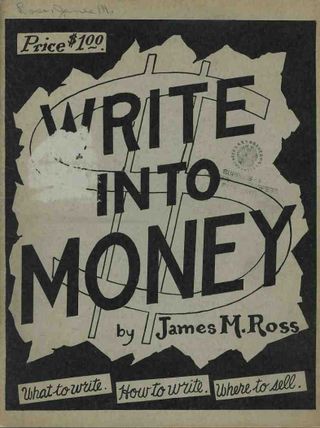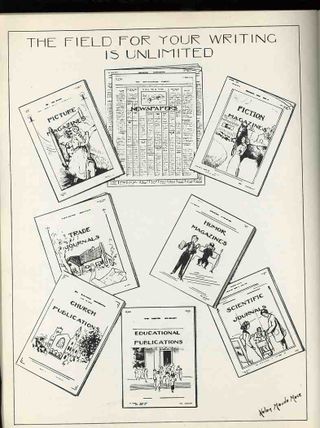JF Ptak Science Books LLC Post 392
A quickly-found pamphlet offers a rejoinder to yesterday's post on making fistsfull of dollars selling poetry: selling prose. The idea is obvious, but the cover isn't, and the ideas behind the idea of selling prose are anything but common, though they are uncommonly bad. The very often self-referenced author of this bit, James M. Ross, writes his way towards the heart of every scribbling wanna be, offering the tines of broken plastics forks and other charitable possibilities and false hope about how and where to sell your sweaty work. The publisher, "The House of Little Books" at 156 Fifth Avenue (a lovely 13-storey building built in 1895), brought out an oversize and skinny (and unpaginated) effort in Mr. Ross's work, publishing the thing in 1939. I can't imagine that it did many people outside the author much good, though it may have made an interesting prop under-the-arm prop for the subway ride home after work.
Mr Ross was a writer of considerable experience--he claims, remarkably, that he was the "special correspondent" for a (listed) 50+ newspapers, plus the author of many plays and pamphlets and other tearsheets--though it really doesn't bolster the gruelly advice that he offers to the dreaming writing reader. Most of the advice is for selling little pieces to newspapers, or selling tips and leads to newspapers, or at least telling where reporters may find a story with the hope of reward coming at the end. All of which doesn't really sound like writing per se to me. Then again, the pamphlet is actually well written. Chapter One, for example is entitled, incredibly, "Where You Live Does Not Matter", and makes the case for fame finding the writer no matter where the writer lives. Ross makes the case for various editors and owners of the NY Times having been small town boys--true enough, but they didn't actually RUN their business from Chattanooga. They moved away. To New York City. Ross forgets that part, and mentions a few other famous small town writers to bolster his point: Roy Howard, Edna Ferber, Fanny Hurst, Irvin Cobb; though Edna and Fanny and Irvin didn't stay small for long. Ross also mentions the dramatically- and difficult-to-say-three-times-fast named Westbrook Pegler (try it!), who I think started in a small town and stayed there. Not that there's anything wrong with small place. I live in Asheville NC for crying out loud, so I'm not having a poke at the small experience--its just the name of the chapter and the logic of the writer that I'm having a run at.
Chapter Two doesn't get much better: "Where is News?".Perhaps if the "is" was italicized the sub might've made a little sense. Chapter Three follows close by on the heels of incredulity: "Many Newspapers Pay for Tips" is a claim that I've not heard too often; but for Mr. Ross to make the claim that someone could make a living doing this stretches the truth a bit. "As has often happened, items you telephone in will finally be accepted without question and your pay check will come along."
As much as something can be tedious for only 40 pages or so, this is, and drags on for fourteen chapters, offering shamelessly and mainly useless tidbits for the flowering reporter/tipster/writer. Ross tells us to "Keep Your Eyes Open" (Chapter Eight) for stories that you might "find on the street", and also to expand our horizons to include writing for "myriads of church publications". And on and on; every one dead-data morsel that we are offered in this book takes the place of two good data points already in our head. No doubt if you read this book a thousand times you'd have nothing at all left in your noggin.





Comments